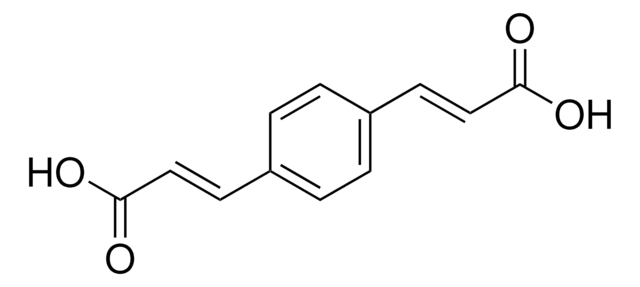759597
4,4′-Stilbenedicarboxylic acid
98%
Synonym(s):
4,4′-(1,2-Ethenediyl)bisbenzoic acid, 4,4′-Dicarboxystilbene, Biphenylethene-4,4·-dicarboxylic acid, H2BPEA, H2SDC
About This Item
Recommended Products
assay
98%
form
powder
greener alternative product characteristics
Design for Energy Efficiency
Learn more about the Principles of Green Chemistry.
sustainability
Greener Alternative Product
mp
400-420 °C
greener alternative category
, Enabling
SMILES string
OC(=O)c1ccc(\C=C\c2ccc(cc2)C(O)=O)cc1
InChI
1S/C16H12O4/c17-15(18)13-7-3-11(4-8-13)1-2-12-5-9-14(10-6-12)16(19)20/h1-10H,(H,17,18)(H,19,20)/b2-1+
InChI key
SBBQDUFLZGOASY-OWOJBTEDSA-N
General description
Application
signalword
Warning
hcodes
Hazard Classifications
Acute Tox. 4 Oral - Eye Irrit. 2 - Skin Irrit. 2 - STOT SE 3
target_organs
Respiratory system
Storage Class
11 - Combustible Solids
wgk_germany
WGK 3
flash_point_f
Not applicable
flash_point_c
Not applicable
Certificates of Analysis (COA)
Search for Certificates of Analysis (COA) by entering the products Lot/Batch Number. Lot and Batch Numbers can be found on a product’s label following the words ‘Lot’ or ‘Batch’.
Already Own This Product?
Find documentation for the products that you have recently purchased in the Document Library.
Customers Also Viewed
Our team of scientists has experience in all areas of research including Life Science, Material Science, Chemical Synthesis, Chromatography, Analytical and many others.
Contact Technical Service










